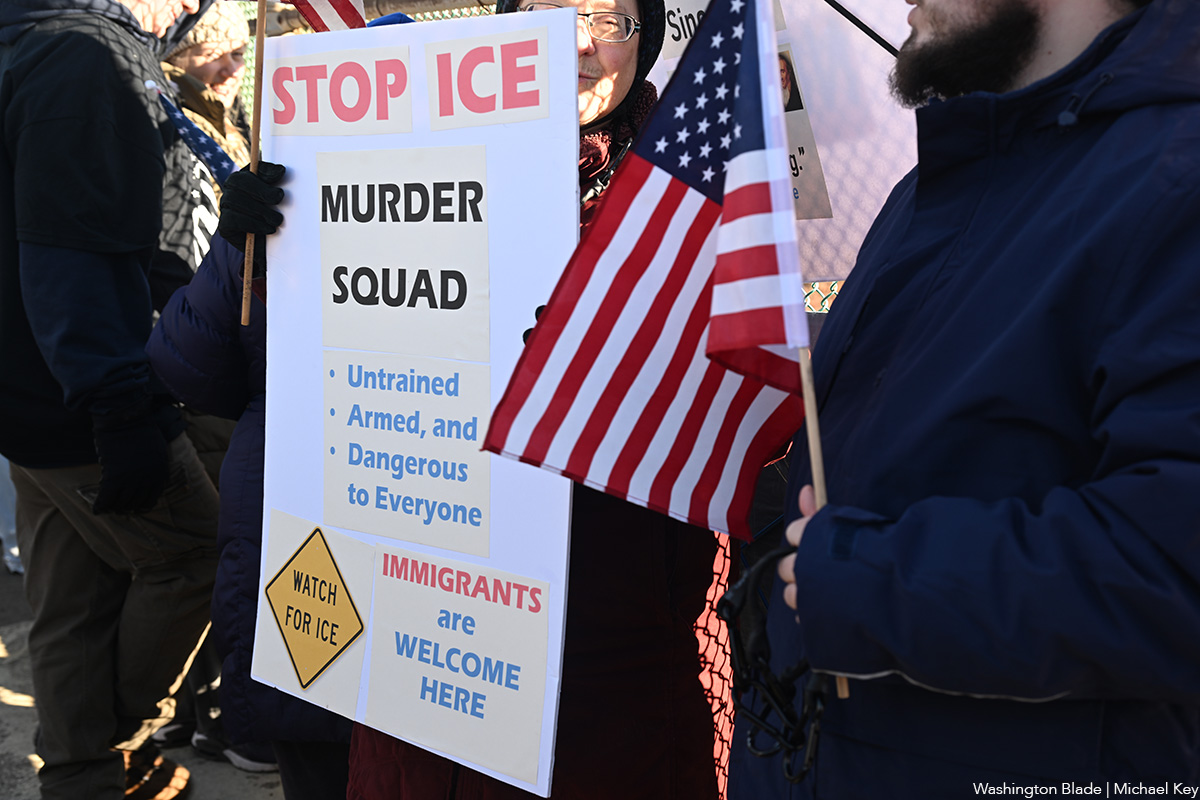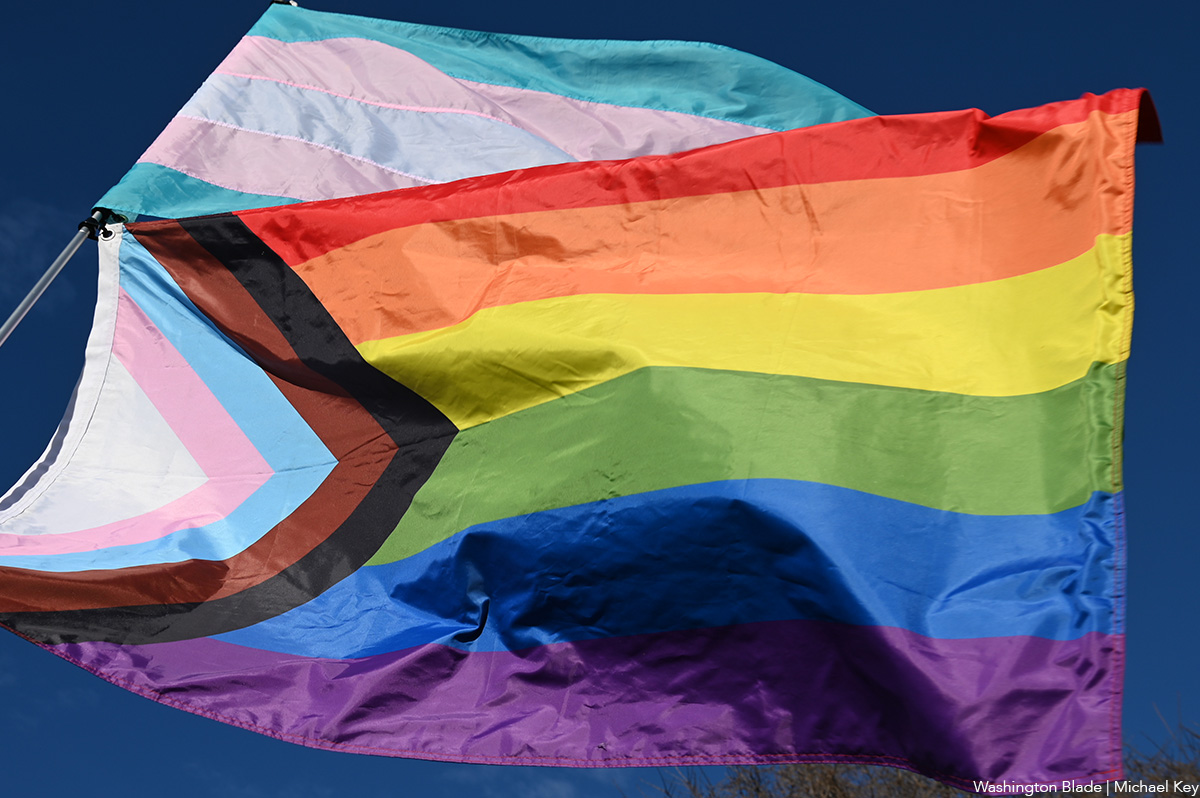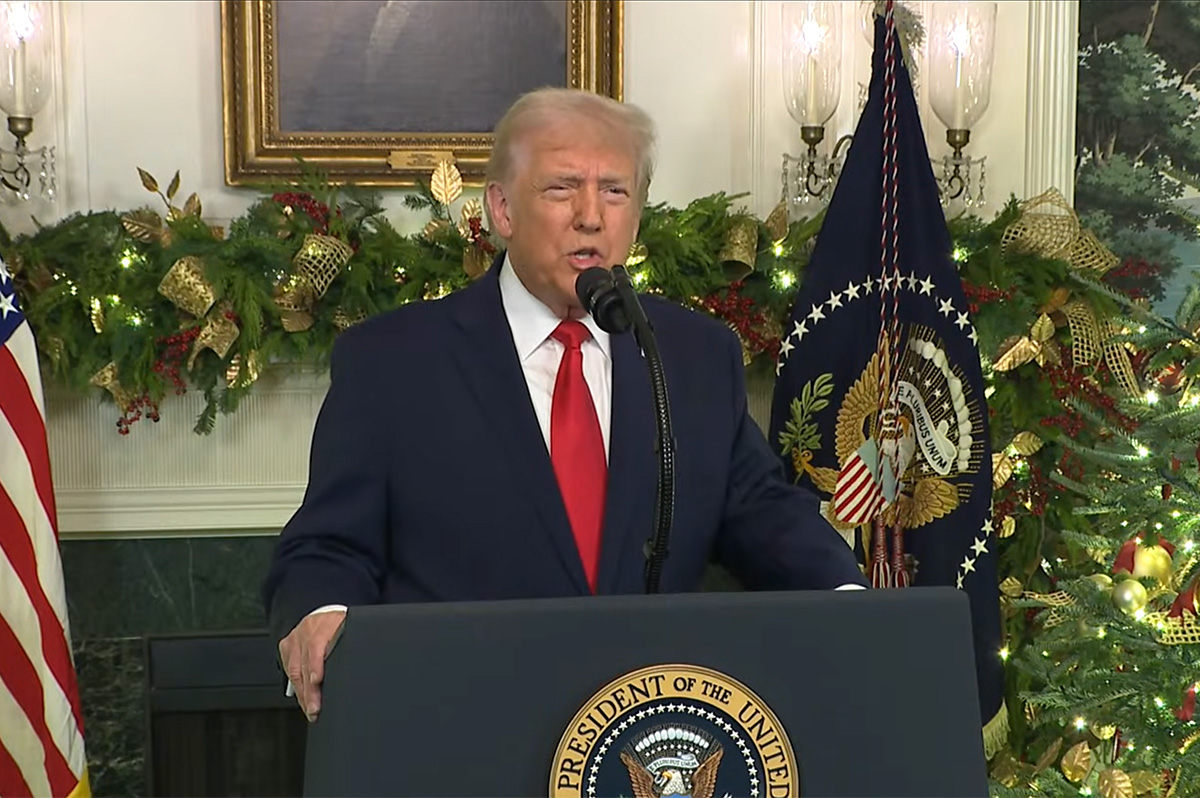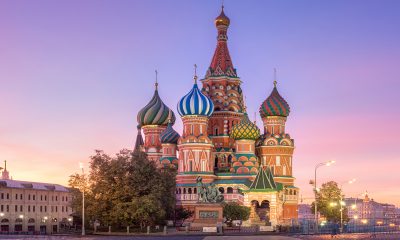Opinions
Kamala Harris is not perfect, but far better than Donald Trump
Republican ticket has voiced support for Vladimir Putin

As a Ukrainian child, I’ve been obsessed with American politics.
I was 13 when I was following my first American presidential election, avidly reading Russian Newsweek and watching the discussion about the debates between Barack Obama and John McCain on Savik Shuster’s political talk show on Ukrainian television.
Obama and Zbigniew Brzezinski, former Jimmy Carter’s national security advisor, were the only Democrat politicians I liked in my “Republican” teenage years. And while I respected Brzezinski for his anti-Soviet views, my sympathy toward Barack Obama was personal.
At 13, I didn’t have words to describe myself as an autistic or trans* person, but I had a feeling that there is something deeply unusual about me. I was cruelly bullied among peers for being “weird.” I knew the history of the American Civil Rights Movement much better than any stories about Eastern European activism, and the idea that a Black man could become the president of the United States while millions of Americans still remember segregation gave me some hope about the possibility of social change.
Now with Kamala Harris and Donald Trump on the ballot this year, I have a particular feeling of deja vu.
If Kamala wins, she will definitely become a role model — not just for girls all around the world but also because she is a Black woman — for people from other minorities, including folks who are living on the intersection of discrimination. Moreover, because she is an outstanding supporter for LGBT+ rights, her victory could be crucial for the LGBT+ community globally, because of American cultural and financial influence.
It is not just her role as an inspirational model that is interesting to me in the context of the coming election, but also the way the election and its outcome is affecting the situation in Eastern Europe and beyond.
The role of American culture
It is not particularly unusual that a Ukrainian child like me was deeply into American politics.
My classmates were less politicized than me, but some of my peers in school liked politics, and teachers often commented on the news. As weird as it could sound for an ordinary American citizen, the 2008 U.S. presidential election was no less popular in Donetsk, Ukraine, than the Ukraine’s Orange Revolution of 2004-2005.
That’s right, ordinary Ukranians cared about the American situation no less than their own, maybe even more. American culture is extremely prominent globally — my Ukrainian and Russian peers who weren’t into politics were into American stuff like Kardashian shows and Hollywood blockbusters.
I think the average American should think a little bit more about the level of influence that American culture and political situation has in this world.
When I was an LGBT+ activist in Russia, I didn’t hear much about the Soviets who were put into prisons for being gay, or the Russian Empire’s history of queerness. On queer events we mostly spoke about the Stonewall riots, the HIV epidemic in the U.S., and San Francisco’s LGBT+ community during the Harvey Milk era.
When activists in St. Petersburg and Kyiv were talking about racism, they spoke about Dr. Martin Luther King and the Black Lives Matter movement, not about Russia’s persecutions of Chechens and Crimean Tatars. In “feminist schools,” the new generation of girls learned about intersectionality from Kimberly Krenshow’s speeches about PoC Americans.
Of course, it partly happened because post-Soviet activists lack the ability to think about their own political situation — Soviet people for years didn’t have any opportunity to participate in politics. Soviet dissidents looked to the West for inspiration, and Soviet officials for finding something that they could criticize to better fit in the party.
But this obsession with the U.S. is not limited to Eastern Europe.
In the Middle East, for example, terrorist groups like the so-called Islamic State even based a significant part of their propaganda on Western memes; making Hollywood-style videos, using American mass-culture references, and deliberately hiring Western supporters — “muhajirin” or immigrants — for media work.
American political and social culture is simply creating cultural trends.
This is why Kamala Harris could really change the perspective of a girl from a PoC background, and bring inspiration to marginalized people. Also, in the age when pro-Donald Trump’s QAnons conspiracy went global, a Trump victory would make far-right ideas much more mainstream.
Russian-Ukrainian war: Beyond the queer context
The situation is actually more complex than it may seem from the first glance.
If we are speaking about the Russian-Ukrainian war, we need to understand that right from the beginning of this war, Russia used anti-LGBT+ bigotry to justify its military aggression.
For example, the Russian Patriarch Kirill, the leader of the biggest and most prominent Christian church in Russia, was saying that the war in Ukraine happened because “people in Donbas do not want to have gay Pride.” We need to remember that at the same time Russia brutally bombed civilians in Donbas region, destroying schools and maternity wards.
The situation with schools is particularly “interesting.”
The governor of St. Petersburg’s region, Alexander Beglov, was saying that the Russian soldiers knew what they were fighting for after they saw gender-neutral toilets in Ukrainian schools.
So for the Kremlin, it is much better to kill children than to let them be queers, and Donald Trump’s running mate, JD Vance, is known not just for his outstanding homophobic and transphobic views, but also for his support of Vladimir Putin. Despite all the pompousness of this statement, Trump and his administration de facto support genocide of queer people.
Kamala Harris has had her own problems with Eastern Europe.
For example, in my opinion, her relationship with Russia is too-centered around the Russian opposition, some of whom are Russian-supremacist, and she lacks understanding of intersectionality and colonial history of Eastern Europe and Northern Caucasus. That was obvious during prisoner exchange this past summer when the U.S. and Germany released Russian killer Vadim Krasikov, who was serving a life sentence in a German prison for killing Zelimkhan Khangoshvili, a Chechen refugee who fought against Russian aggression in his homeland. The family of the victim wasn’t informed and Zelimkhan’s wife didn’t have an opportunity to react to the situation or participate in negotiations. German authorities and the Biden administration during the exchange didn’t ask Russia to release any Chechen political prisoners from Russian prisons.
The Khangoshvili case was extremely prominent for the Chechen community and could be compared to the George Floyd murder for Black Americans. So Krasikov’s release made Chechen communities in the U.S. and Europe believe in Kamala’s xenophobic tendencies. It is especially true after the long history of ignoring of Russia kidnapping and torture of Chechen civilians, and the fact that prominent Democrats, including Joe Biden, spoke about Chechnya only or mostly in a context of persecution of LGBT+ people.
When I spoke with Chechen activists about it, some of them started to believe a kind of a “gay lobby” conspiracy because of this situation, while others like to point out that it was under Russian authorities when gay people began to disappear in Chechnya. Before Russia’s occupation of Chechnya in 2000, private sexual lives was just a taboo topic, and any idea of “spying” on someone because the person could be gay, or reading private messages was considered an abomination. Western officials at the same time mostly believed Russian activists who are quite xenophobic, and made it all look like a problem of Chechen culture, not a direct result of Russian politics in Chechnya where people could be kidnapped and tortured literally for anything, from listening to a prohibited music to making a political joke on social media. Chechen Americans became alienated from Republicans because of their Islamophobia and anti-immigrant sentiments, and they are also alienated from Democrats. And the situation has worsened because Russian authorities often kidnap Chechen refugee-activists’ relatives in Chechnya, forcing Chechen in the West, including American Chechens to be quiet, and nobody in American politics is addressing the problem.
This is not just a Chechen issue.
American Democrats for years were collaborating mostly with civil society activists from the Russian opposition, ignoring Crimea Tatars, Ukrainians, Belorussians, Georgians, and other people from post-Soviet states. They, while not deliberately, supported Russian propaganda that said the entire Eastern Bloc is one big “Mother Russia,” so they have a lot to work with.
Even though Democrats had their own issues, Republicans were making the same mistakes, and showing their open bigotry.
The stakes are now higher than before. Donald Trump is not just xenophobic and homophobic but also known for his collaborations with Vladimir Putin’s regime that committed horrendous war crimes in Chechnya, Syria, Libya, Mali, and, finally, Ukraine.
Americans could choose a convicted sex predator who had ties with a genocidal regime in Russia, or they could choose the imperfect, but ready-to-learn first female American president who would make the world more acceptable in the eyes of those who live overseas.
Ayman Eckford is a freelance journalist, and an autistic ADHDer transgender person who understands that they are trans* since they were 3-years-old.
Opinions
ICE agents murder another American citizen in Minneapolis
Trump and his Cabinet are the real ‘domestic terrorists’

ICE agents murdered another American citizen on the streets of Minneapolis. His murder is both caused, and condoned, by the evil felon in the White House, and his incompetent, and equally evil, Secretary of Homeland Security, Kristie Noem. She, the woman who thought nothing of killing her dog, now apparently thinks nothing of killing American citizens. The most recent murder, condoned by both of them, occurred on Jan. 24 and was that of Alex Jeffrey Pretti, a 37-year-old U.S. citizen.
His grieving parents released a statement, “We are heartbroken but also very angry. Alex was a kindhearted soul who cared deeply for his family and friends and also the American veterans whom he cared for as an ICU nurse at the Minneapolis VA hospital. Alex wanted to make a difference in this world. Unfortunately, he will not be with us to see his impact. I do not throw around the hero term lightly. However, his last thought and act was to protect a woman. The sickening lies told about our son by the administration are reprehensible and disgusting. Alex is clearly not holding a gun when attacked by Trump’s murdering and cowardly ICE thugs. He has his phone in his right hand, and his empty left hand is raised above his head while trying to protect the woman ICE just pushed down all while being pepper sprayed. Please get the truth out about our son. He was a good man. Thank you.”
All this occurred amid heightened tensions in the city following recent clashes over federal immigration actions. The chaos in Minneapolis is clearly caused by the federal agents. We have also been told by the Minneapolis police that Pretti had no criminal record beyond minor traffic violations and held a valid Minnesota permit to carry a concealed weapon. His family said they had never seen him carry it.
The chaos in Minneapolis was heightened after an ICE agent murdered Renee Good, while she was in her car. The agent who shot her was clearly seen in videos to be in no danger. “An autopsy commissioned by the family this month, found that she suffered three clear gunshot wounds, including one to her head, lawyers for her family said Wednesday. One of the injuries was to Good’s left forearm, the lawyers said in a statement, while another gunshot struck her right breast without piercing major organs. Neither of those wounds was immediately life-threatening, the attorneys said. A third shot entered the left side of Good’s head near the temple and exited on the right side, according to the statement, and she also appeared to have sustained a graze wound.”
After both these murders, the felon and his lapdog, Noem, claimed the murders were appropriate as both victims were ‘domestic terrorists.’ In both cases they told Minnesota law enforcement they could not participate in the investigation. Clearly, they don’t want real investigations. It has become crystal clear, the felon in the White House considers anyone who disagrees with him, or his policies, a ‘domestic terrorist’. I, and so many others, consider the felon, and his personal Goebbels, Stephen Miller, along with Noem, and others in his Cabinet, to be the real ‘domestic terrorists.’
In my lifetime, I have never seen a president declare war on American citizens, but that is what this president is doing. He is sending federal agents, including the National Guard, into cities across the nation, to fight with, and threaten to curb, the legal actions of American citizens. He is a clear danger to our democracy, and is being assisted by the Republicans in Congress, and the Supreme Court. They are all guilty of enabling his vicious attacks on all of us.
When Renee Good and Alex Pretti were gunned down, we all suffered. We were all attacked, when they were attacked. None of us can feel safe if during a legal demonstration, we can be murdered, and no one will step forward to stop it from happening. We live in a country where our Secretary of Health and Human Services, RFK Jr., is literally killing children by saying they shouldn’t be vaccinated against diseases that can be prevented with a vaccine and by ending research into Alzheimer’s, cancer, and HIV/AIDS. This is the government of the felon, and his campaign against our own people.
Every person in a minority, or group who has ever been discriminated against, is at risk while the felon is in the White House. Whether you are a woman, Black, Asian, Latino, Jewish, Muslim, or LGBTQ, you are being threatened by this administration, your rights, and even your life, are being threatened. We must all stand together, and work to stop him, or as the poem, “First They Came,” attributed to Lutheran pastor Martin Niemoller, will prove to be true. There are many versions of the poem and just put your group in any of the paragraphs, and you will clearly understand its meaning. The United States Holocaust Memorial Museum quotes the following text as one of the many poetic versions:
First, they came for the socialists, and I did not speak out—Because I was not a socialist.
Then they came for the trade unionists, and I did not speak out—Because I was not a trade unionist.
Then they came for the Jews, and I did not speak out—Because I was not a Jew.
Then they came for me—and there was no one left to speak for me.
Peter Rosenstein is a longtime LGBTQ rights and Democratic Party activist.

Authoritarianism does not announce its arrival. It’s too cowardly for that. It advances quietly, at the margins, testing how much fear and cruelty a community will tolerate and what bystanders will allow to happen to fellow human beings. History shows that queer folks, especially trans people, are often targeted first. That targeting is not incidental. It is intentional.
Defending queer rights is not a niche concern. It is a test of democratic health. A society that allows one group to be targeted will not stop there. Those who come for queer people in the morning are the same that go for educators, journalists, voters, and civil institutions in the afternoon. This is not speculation. It is a well-worn pattern.
Around the world, LGBTQ+ communities are under coordinated attack. In Russia, the so-called “international LGBTQ movement” has been labeled extremist, legally equating queer identity with terrorism. We are seeing distinct echoes of that foreign influence here at home. Elsewhere, governments criminalize queer existence, erase trans people from public life, or force people into silence through intimidation. The sequence is familiar: dehumanizing rhetoric, restrictive policy, and eventually open endorsements of violence. When these warning signs are ignored, repression accelerates.
It would be comforting to believe this is distant or abstract. It is not. In the United States, LGBTQ+ people, including trans people, have sought asylum abroad because they no longer feel safe in our own communities. When our neighbors must leave to feel safe, we have failed our community.
Experts at the Lemkin Institute for Genocide Prevention have warned that trans communities in the United States face serious and escalating danger. Their analysis is grounded in history. Genocide is not only mass killing. It is the systematic destruction of a group’s ability to exist safely and openly. Legal erasure, public demonization, exclusion from institutions, and tolerated harassment are all early stages of that process. History is clear. The time to act is before harm becomes irreversible.
Democratic backsliding rarely arrives with fanfare. It comes through school board votes, bureaucratic rules, elected leaders’ inaction, and symbolic reversals that seem small until they accumulate. This is how erosion takes hold.
In Salisbury, Md., my hometown, that erosion has become visible. The city halted the flying of Pride flags during Pride month and removed our downtown rainbow crosswalk. These were not neutral administrative choices. They sent a clear message to queer residents that their visibility and belonging are unwelcome.
When a community removes symbols that affirm dignity and safety, when books reflecting queer realities are pulled from schools and libraries, when children are excluded from participating in life simply because they are different, it creates harm. It teaches that difference is dangerous. And when politicians and people in positions of responsibility fail to protect trans kids, real harm follows: mental health crises, isolation, and even lives lost.
Pride flags, rainbow crosswalks, inclusive curricula, and supportive policies are not merely symbolic. They communicate that everyone belongs and that discrimination will not be tolerated. Removing them isolates queer people and emboldens those who see community as an exclusive club rather than a shared responsibility.
Queer liberation is not separate from the liberation of the broader community. It is inseparable from it. Living openly as queer challenges systems built on fear, rigid roles, and enforced conformity. When queer people gain ground, everyone gains ground. Each victory for queer liberation strengthens democracy itself.
This is how we know progress is possible. Every time a Pride flag stays flying. Every time a crosswalk remains painted. Every time a local ordinance protects gender identity. Every time a school affirms a student’s dignity. These are not small wins. Liberation grows through accumulation.
National politics can feel chaotic and overwhelming. Federal institutions are slow, complex, and distant. But democratic defense does not begin there. It begins locally, when neighbors show up to town halls, demand accountability, and refuse to let bigotry shape policy. It does not take extraordinary power to protect a city council chamber or a school board meeting. It takes people willing to stand up. It takes bystanders willing to step in.
This is the moment to act. Silence enables erosion. Action creates momentum. The question is not whether change is possible. It is whether you are willing to claim it.
Queer liberation is your liberation. When we defend the most targeted among us, we defend the future we all share. Every Pride flag flown, every rainbow crosswalk returned, every book left on the shelf, and every policy that affirms dignity sends a message far beyond town limits. It tells the world that democracy is being defended here.
Local victories are global victories. And every one of them matters.
Will Fries. is a Maryland communications strategist with experience in multiple major presidential campaigns.
Opinions
The felon in the White House must be stopped
Are there any decent Republican members of Congress left?

We are up shit’s creek if the felon in the White House actually thinks he has a Nobel Peace Prize. If he believes he deserves one, or Venezuelan opposition leader Maria Corina Machado had any other reason to give him hers, than it was easier, and less degrading, than going on her knees to him, as a number of men already have. I don’t know if she understood how many millions the medal could be worth. Instead, she could have used it for her people, if she didn’t want to keep it.
Machado was awarded the Nobel Prize for her work for the Venezuelan people. She spoke up for them, and fought for them. The felon couldn’t care less about them. He proved that by invading, and then supported Maduro’s vice president as president. He said he, and his fascist cohorts, would run the country, and is now stealing their oil and personally deciding what to do with it. After U.S. troops captured Venezuelan President Nicolás Maduro, Trump said, Venezuelan opposition leader Maria Corina Machado “doesn’t have the support within Venezuela to be its next leader, she was not consulted prior to the operation.” He went on to say, “I think it would be very tough for her to be the leader. She doesn’t have the support within or the respect within the country.” This is the slime bag she gave her Nobel Peace Prize medal to. I hope she is not naïve enough to believe he really cares about her, or her countrymen, and women.
Trump is vile, sick, and mentally deranged. He is threatening foes and allies alike. They see bending a knee to him only works for the moment, but has no long-term impact on his tiny brain. Today, he is threatening Greenland, and our NATO allies are moving their military to Greenland to protect it against the United States. Now he is threatening them with new tariffs. That would have once been unfathomable. He is saber rattling over Iran, Colombia, even Mexico. He is bombing Nigeria and Syria.
If that weren’t enough, he threatens to use the Insurrection Act to send the military into cities here. He has already sent in thousands of ICE agents. ICE is classified as a federal law enforcement agency under the Department of Homeland Security. They have authority to arrest, detain, and investigate immigration violations. However, the law is clear; ICE agents do not have unlimited power. They face significant constitutional restrictions that many people don’t realize, especially when it comes to entering homes and private spaces. But what is clear, in Minneapolis today, some of the agents are acting like the Gestapo. They are smashing car windows, pulling people out of their cars, invading homes, and workplaces, all without first having any proof the people they are going after are guilty of anything. I believe we need fair immigration laws, and they should be enforced. But this is clearly not what the felon is doing. The felon in the White House and his incompetent stooge at Homeland Security, Kristi Noem, who has no idea what the hell she is doing, are acting egregiously, and making a mockery of our democracy.
The president, Noem, Hegseth, Bondi, and the other incompetents in the felon’s Cabinet, simply pretend to forget the history of the United States. They don’t want to accept the truth; we are a nation of immigrants. It is immigrants who built our country, and are still building it. My parents were immigrants escaping from Hitler, and they came here and built a life, and in doing so, added to the greatness of our country. I want every person around the world who needs to escape from dictators, and despots, to be able to do the same as my parents did. We need to build an immigration system that allows them to do that. Instead, because of what this felon is doing, we are seeing American citizens thinking of leaving this country, and looking for asylum in others. That is really sick, but it’s happening.
Sitting in the Oval Office today we have a felon who is reveling in becoming the war president. He is taking the United States down an incredibly dangerous path, threatening our own citizens with violence here at home, and doing the same to our allies around the world. He, and the incompetents and fascists surrounding him, need to be stopped. If there are any decent Republican members of Congress left, they need to join with Democrats, and the voters, to stop him.
Peter Rosenstein is a longtime LGBTQ rights and Democratic Party activist.


















